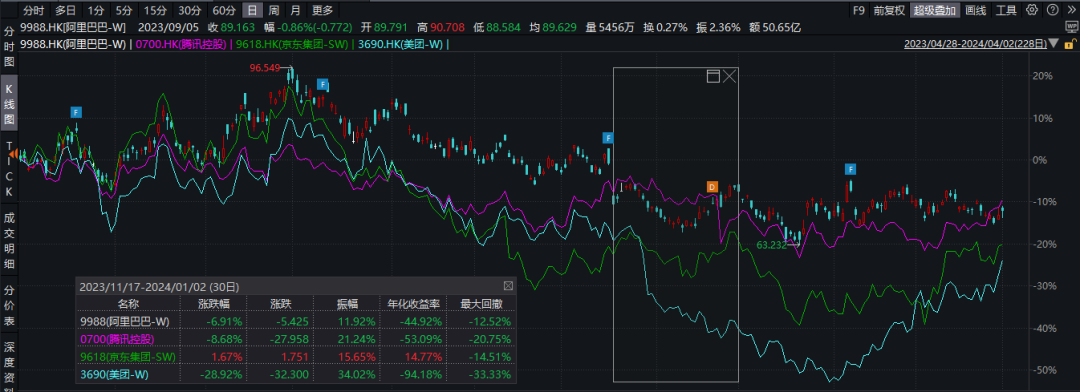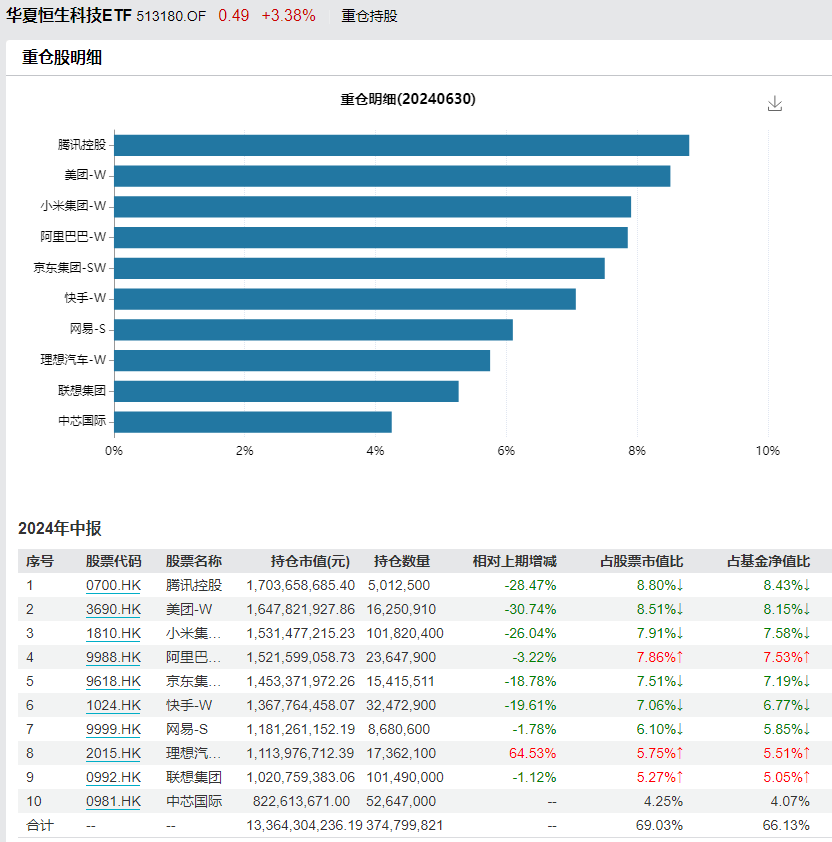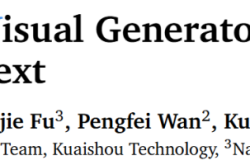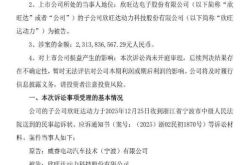Interest rate cut begins, the long-prepared Hang Seng TECH Index is ready
![]() 09/20 2024
09/20 2024
![]() 620
620
Yesterday, the Federal Reserve finally began to cut interest rates, lowering them by 50bp in September. According to the Fed's dot plot, the total interest rate cut for this year may reach 100bp. Despite the strong performance of US stocks, the interest rate cut may not necessarily lead to a large-scale return of global capital to Hong Kong stocks. However, the appreciation of the Renminbi exchange rate indicates that one of the important external factors that have constrained Hong Kong stocks for two years has been lifted. After the Fed's interest rate cut, the exchange rate approached the 7 level, relieving exchange rate pressure and providing more easing windows and conditions for the domestic market. Lower financing costs for enterprises are more suitable for the current low-growth environment. Therefore, after the Fed's 50bp interest rate cut, we have seen the Hang Seng TECH Index ETF (513180.SH) surge nearly 5% in the past two days, indicating that smart money in the market is accelerating its layout in anticipation of the interest rate cut scenario.
For example, Tencent (700.HK), the leader of the Hang Seng TECH Index, is currently approaching its annual high after consolidating for two months; Meituan (3690.HK) and Alibaba (9988.HK) have also hit their annual highs.
I. Repurchases by Internet Stocks Show Significant Results
First, reviewing the recent trend of the Hang Seng TECH Index, since the explosion of the yen carry trade in early August, volatility in global stock markets has increased. From early August to now, A-shares have continued to weaken, falling by over 5%, but the Hang Seng TECH Index has risen by nearly 8%, decoupling from A-shares. Meanwhile, the S&P 500 and Nasdaq have risen by nearly 5%. In terms of valuation, Hong Kong stocks remain the market with the lowest valuation overall, with the Hang Seng Index currently trading at a PE ratio of only 8.8, lower than the 11 times PE of the CSI 300 and the 20 times PE of the Nikkei 225. In other words, over the past month, the Hang Seng TECH Index has been relatively independent, with decreasing influence from external factors. With the improvement in liquidity and policy space, the Hang Seng TECH Index, which has been performing well recently, has even more reason to be favored by the market.

Here are two examples to illustrate the changes in Hong Kong stocks. First, the unwinding of the yen carry trade in early August triggered a global stock market sell-off, but A/H shares, which have a low foreign ownership, bucked the trend. From August to now, A-shares have continued to decline due to weak economic data, but the Hang Seng TECH Index, which usually follows A-shares, has decoupled from them. Even during the US stock market correction in August, the Hang Seng TECH Index was relatively resilient, ranking among the top-performing indices over the past month. Another example is the earnings miss by Pinduoduo (PDD) and the sale of JD.com (9618.HK) shares by its second-largest shareholder, Walmart. In the past two years, whenever a major Chinese stock has suffered an earnings miss, other Internet stocks have also been dragged down. However, this time, although the impact on Tencent, Alibaba, Meituan, and JD.com was felt on the day of the news, share prices quickly recovered afterward, indicating a more positive market sentiment towards Internet stocks.

The Hang Seng TECH Index's stability can be attributed to the significant impact of large-scale repurchases by Internet stocks. Although repurchases did not seem to have a significant impact on stock prices in the first half of the year, the returns generated for shareholders by Internet stocks were very high, surpassing the paltry 2% yields offered by government bonds. With further interest rate cuts expected, investors should focus on Internet stocks with stable growth potential rather than government bonds with declining yields. According to disclosures, Tencent repurchased HK$52.3 billion worth of shares in the first half of the year, reducing its total share capital by about 1.45%. Alibaba repurchased US$10.6 billion worth of shares, reducing its total share capital by about 6%, while JD.com repurchased US$3.3 billion worth of shares, reducing its total share capital by about 7.1%. Assuming Tencent maintains daily repurchases of HK$1 billion for the rest of the year, after accounting for repurchase blackouts and public holidays, Tencent's annual repurchases could reach nearly HK$130-140 billion. Together with a dividend of RMB 33 billion, Tencent's direct return to shareholders would reach 5%, and with a neutral earnings growth expectation of 8%, Tencent's full-year EPS could exceed 10%. Similarly, if repurchases and dividends remain at current levels, Alibaba's total share capital could decrease by nearly 12% this year, while JD.com's could decrease by about 10%.
While repurchases by Internet stocks may support share prices, they are not sufficient to drive a major market rally. Factors such as Alibaba's inclusion in the Stock Connect program, interest rate cuts by the US and China, continued inflows of southbound capital, and an improved competitive landscape for Internet stocks are acting as catalysts for the current market rally. Although each of these factors alone may not be particularly noteworthy, their combined effect is creating a significant market momentum. Investing in the Hang Seng TECH Index or Hong Kong stocks requires seizing the right moment when the market dynamics are shifting. This year, Hong Kong stocks saw a rally in April, with the Hang Seng Index rising 21% in a month. The current rally could be seen as the second wave of the year, although its magnitude may not match that of April. However, with the support of various factors, the Hang Seng TECH Index offers greater safety.
II. The Hang Seng TECH Index After an Improved Competitive Landscape
From a component stock perspective, investing in the Hang Seng TECH Index through ETFs is more appropriate at this stage. Firstly, ETFs tend to outperform individual stocks in terms of gains. Secondly, the current rally is largely driven by macroeconomic improvements, and interest rate cuts are generally positive for most companies. For example, Tencent, Meituan, Xiaomi, and Alibaba, among the top ten holdings, are all approaching their annual highs. By investing in the ETF, investors can own these high-performing stocks while also gaining exposure to companies like JD.com, Kuaishou, NetEase, and Lixiang, which are trading at low valuations despite their solid second-quarter results.

In particular, the competitive landscape for Meituan, Alibaba, and JD.com, among the top ten holdings, has improved. For instance, Meituan and Douyin have found a profitable niche in local services and instant delivery, while reducing losses in its Xiaoxiang supermarket business. This positions Meituan for continued growth. Similarly, Alibaba and JD.com have adopted a more defensive stance against Pinduoduo's aggressive expansion, focusing on maintaining positive growth rates and utilizing their cash flow advantages for share repurchases, which can generate significant returns for shareholders. For example, Alibaba's total share capital is expected to decrease by 12% this year, while JD.com's is expected to decrease by 10%. Notably, the competitive dynamics in the e-commerce industry have also improved, as Pinduoduo has become less aggressive in squeezing merchants, and all three major players (Pinduoduo, Alibaba, and JD.com) are now offering subsidies to merchants rather than engaging in price wars. This bodes well for industry profit margins.
Conclusion
Overall, in the current low-valuation environment, Internet stocks offer a more compelling investment thesis in the interest rate cut cycle. Their performance in the first half of the year, shareholder returns, and improved competitive landscape make them stand out as companies that can provide stable returns in the current macroeconomic environment. Potential catalysts, such as over RMB 200 billion in southbound capital inflows over the past four months, easing exchange rate pressures, and expanded domestic policy space, are converging to create an opportune moment to invest in Hong Kong stocks through the Hang Seng TECH Index ETF (513180.SH).








